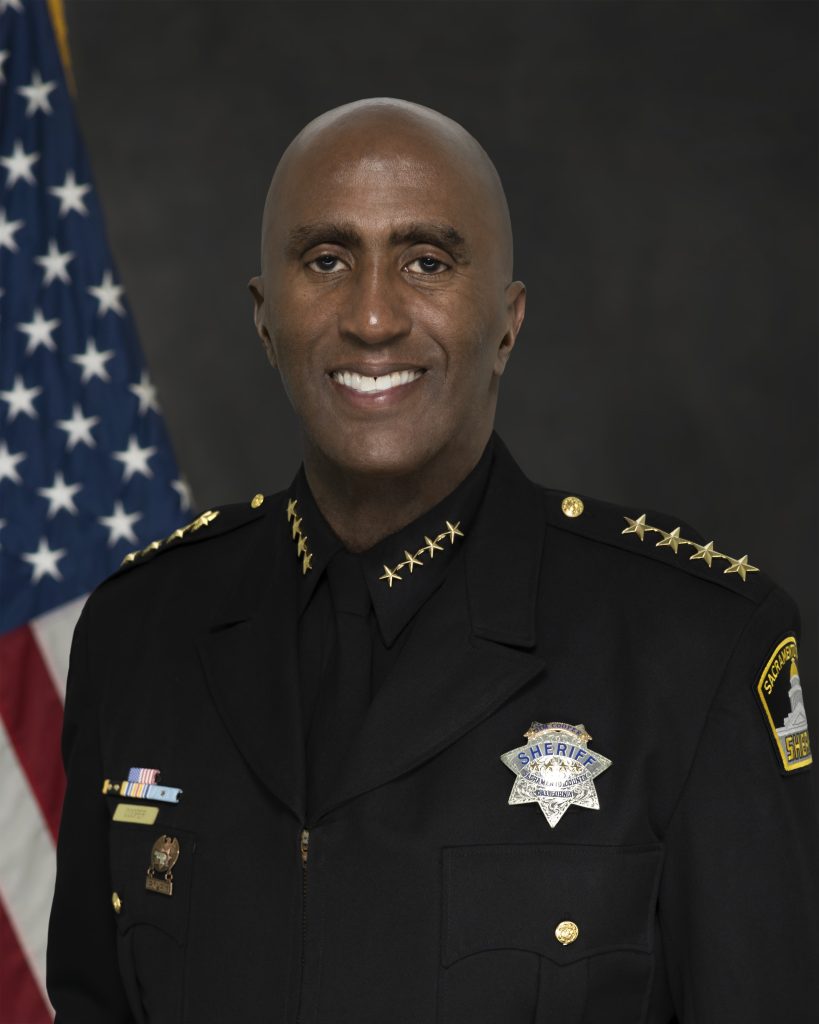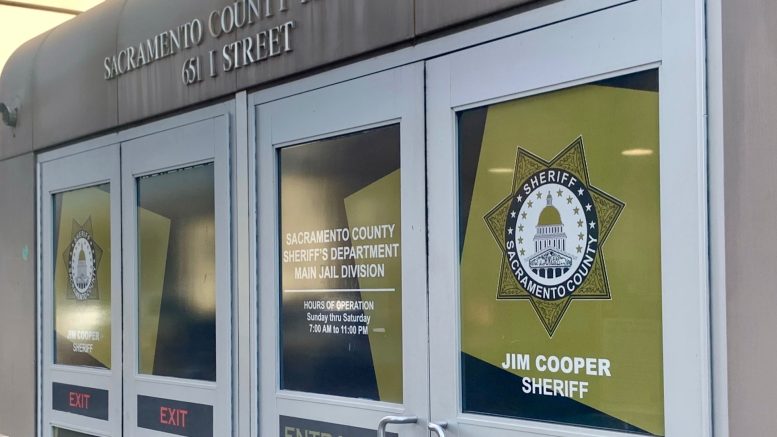Last December, Sheriff Jim Cooper was sworn in at the Sacramento State Ballroom, thereby becoming the first Black Sheriff in the county’s history.
Cooper has experience with firsts—he was also the first Black mayor of Elk Grove. And he’s no stranger to the Sheriff’s office, where he worked for 30 years (and was the first Black spokesperson). He also has a political background, elected to the State Assembly in 2014, where he served as assistant majority floor leader and a member of the California Legislative Black Caucus.
But even with this impressive resume, Cooper has admitted he faces challenges in his new role. We caught up with him to discuss his thoughts on it all.

Why did you decide to become Sheriff?
It was timing and I didn’t really envision doing this. I had four more years left in the Assembly. But to be honest, in the legislature, you’re one of 120 putting bills through both houses, multiple committees, and then hoping the governor signs it.
And I’d done that. Got bills passed, got bills vetoed. Helped usher legislation through, helped kill legislation. So the Sheriff—I thought it has an important role. It’s countywide in the capital city. That’s why I decided to come back to the Sheriff’s department.
Some people think I’m crazy though, for doing it.
In the eight years that you were in the legislature, what were the major takeaways?
The big thing, obviously having spent 30 years in law enforcement, 15 years in local government, it was somewhat of an echo chamber. You don’t get different views or perspectives.
(But) you go to the legislature and you’ve got varying degrees of opinions, experience, so you learn a lot about what other people think, so it’s OK to disagree, but we can be civil, we can be courteous to each other. We can work together and we have worked together. It was a great period for me to learn. I’m very thankful for it.
What are some of the bigger challenges you want to work on in the Sheriff’s department?
Homelessness. That’s a big issue statewide. The polls are unbelievable—the public wants something done about homelessness and No. 1, it’s not a crime to be homeless. Absolutely, it’s not a crime to be homeless. But the state has spent $20 billion on homelessness. And for our homeless population, that’s over $100,000 per person. (But) it’s gotten worse. My issue is … they don’t want to be unhoused anymore, but you have people that are mentally ill that can’t make a decision for themselves. Then some folks have a substance abuse issue and they don’t want to come in. So if you look at it, that’s a significant part (of the population) that doesn’t want help, and the professionals in the business know this, and we haven’t addressed it.
You have to have some type of a mental health court. The Governor started Care Court, (but) we have to go much further and consider conservatorship. People hear ‘conservatorship’ and think ‘No way’—(but) if someone’s walking around naked eating out of a trash can, dodging cars in and out of traffic, they’re OK with that? That’s not humane. So if we have to have a conservatorship for our most gravely ill, let’s do that and hopefully get them right. And they don’t belong in jail—the group in jail that are mentally ill shouldn’t be in jail.
If I have a sore throat or I hurt my knee, I can go to med clinic. If you’re having a mental health crisis, there is nowhere to go except the emergency room. On the weekends and during the week, you see the ER packed with gurneys, and people in the hallway with officers who are mentally ill and they shouldn’t be there.
Also, the substance abuse drug court went away. There’s no more drug court unless you want to get your record expunged. We know that rehabilitation’s very expensive, even if you have benefits, so we have to focus on those two (issues). We haven’t as a state, not in the way we should.
You oversaw the Sacramento County jail… and you’re taking a different approach in terms of law enforcement here. Is there a plan to modify law enforcement mental health treatment in the way that you were talking about?
No. 1, (the county doesn’t) have the staff to treat it. That’s why the (state) Department of Corrections had a medical facility built in Stockton to deal with medical and psychiatric issues. They had psych wards. The downtown jail has a psych ward of 16 or 18 beds. In county jail, you’re trying to be all things. You’re trying to run programs, you’re trying to do education, rehabilitation, let alone have the facilities for mental health treatment. None of the counties were built that way. They weren’t built for long-term housing.
It is 100% a state issue. They had institutions before, but they were closed a long time ago. I’m not saying go back to institutions, but somewhere these people can go and get help. Because I’ve seen people come to jail, get on medications and get normal again. But it shouldn’t take that happening in jail. It has to be intervention on the streets. You have folks that are, I guess for lack of a better term, frequent fliers who use a lot of services, be it at the hospitals, fire department, law enforcement, and they’re draining resources. Let’s get them the help they need.
I would argue it’s a better life if they’re getting three meals a day, showers, and they’re in a place that’s housed, then left to their own devices on the streets. No one wants to be the adult in the room and make the tough decision and say, ‘Hey, we’re gonna do this.’
And you have to have some type of substance abuse program/rehab program. Because right now when drugs are decriminalized—and that’s what the public wanted so we did that—you have a lot more people that are using illicit drugs and law enforcement’s not enforcing it. And a lot of domestic violence happens because of substance abuse, a lot of burglaries, robberies … that are coordinated with drugs. We have to get the people the help they need. Right now that is not happening.
So to build rehabilitation back into those kinds of programs is the key to solve these law enforcement problems?
100%. But then you need the carrot and the stick. You have that population that doesn’t want help. So what do you do with them? Do you force them into that? Do you apply the laws and go the criminal path? With drug court, a judge could say, ‘Hey, you know what? We’ve tried several times, it’s not working. I’m gonna lock you up and get you clean. And then once you’re clean, we can expunge your record.’
With a new jail, how will that impact your job and the county?
We have to come up to standard and most county jails are older jails. You don’t see a lot of new jail construction. So that new tower’s just going to address that. And to be honest, we’ll be lucky to have that new tower built in six years.
It was tough to get through and it’s frustrating to have opponents against it. Like I said, we’re not looking for more jail. We’re looking to enhance the space we have already and get enough beds for the mentally ill and enough beds for people that have medical issues … we deal with on a daily basis.
The City of Sacramento did a study on racial disparity in law enforcement. The data that came back was shocking. If you’re African American, getting pulled over is five times more likely and traffic stops are three times more likely. I want to get your thoughts on that.
We want to treat all people fairly and equally. That’s probably the most important thing. It’s not easy being law enforcement. A lot of it is driven for calls for service. You look at who’s been affected by gun violence and we see that it’s African Americans. You have to give your people the best training you can and that’s the important part about bias-based policing. Those numbers shouldn’t be that way—obviously we want to try and make sure that we’re unbiased in our stops.
But my frustration is that we know where the violence is in those communities. You look at folks that have revitalized downtown and done a lot of things downtown, a lot of building, look at the areas that are underserved areas that have been that way forever. What have they built there? I’m talking countywide, city and county. Zero. What do they have in common? Underperforming schools. No banks, no supermarkets, no arts programs or sports programs for kids. If you want to talk about a school-to-prison pipeline, that’s in those neighborhoods, and until you put the money and invest in those communities, nothing’s going to change.
Every kid should get a chance. But these kids get negative role models there, where it’s gangs or drugs. I live in Elk Grove—Laguna Boulevard and I-5 and Meadowview are 2 miles away. Those schools in Meadowview—free breakfast, free lunch and free dinner. Very, very low income. None of those (youth) programs out there. But you go to Elk Grove, 2 miles away, the largest youth soccer registration in the country, the largest Cal Ripkin baseball league west of the Mississippi, 15,000 kids playing youth sports. Meadowview doesn’t have that. I would argue if those kids had the same opportunities to do some of those things and keep busy, their lives would be dramatically different. That’s what it comes down to, investing in those poor communities. I was out there undercover buying drugs back in 1988 and the same crap is going on (today). We have never invested in those communities.
The question I’m asking you is, if I’m driving my car down the road and I have more pigment in my skin, and I’m three times more likely to be pulled over for the same offense, it would piss me off.
Right. I mean, it concerns me, but I would say, are they out in Citrus Heights? Are they out in Arden Park? That’s part of the issue. It’s tough being out there doing that. A lot of it goes for the calls for service. Where are your shooting’s occurring at? Where’s the violence occurring?
So it’s how do we balance that? It’s working with the community. I do see over-policing in some communities. How do you change that narrative?
Do you think part of it is that the police department, the Sheriff’s department, needs to do some deep-thinking about their own?
I think so—and that’s why we train officers in bias-based policing.
But also, you know, who wants to be a cop these days? We’re having a hard time. Everybody’s having a hard time hiring. I’m down 100 officers. CHP’s down 1,000 statewide.
You know, you can do a thousand good things, but one bad thing happens, that’s all that matters. So we’re having a very hard time recruiting officers.
But when something bad happens, you’re going to pick up that phone and call 911. You’re going to talk all the smack you want about cops and stuff. Well, something happens. You want them to be there for you. So it’s a delicate balance. There’s no easy answer.
Do you have any recommendations on trying to reduce gun violence?
You have to have the resources. Because right now the gun violence is off the hook. People dying every day. Kids of color dying every day. Black kids dying every day, from gunshots.
You have to put money in those neighborhoods. Law enforcement’s got some culpability, but I think if you invest in those neighborhoods and give kids opportunities, you change the entire narrative on this and you don’t see over-policing. That’s the ultimate answer. But you know what? That takes a hell of a lot of money and the wherewithal to do that.
Anything you’d like to add?
The legislature was a lot easier because you’re one of 120 members. I can be in bed at night sleeping and get in trouble for something someone else did. So it’s a very hard job at times. (But) it’s very rewarding. And I love it. I’m passionate about it. I’ve lived in Sacramento my whole life. I’m not moving somewhere else. I think we’re gonna be a better department. I think we already are a better department. I’m still in my first 30 days and really putting my stamp on the department, where we want to go, but ultimately a lot of things we do are reactionary, unfortunately.
I want you to give me a commercial to help recruit these hundred deputies that you need.
No. 1, it’s a great career. The money’s pretty good.
You can change people’s lives in an instant through your interaction. You’re not stuck behind a desk. You can do so many different things: work in the jails, the courts, patrol, detectives, we have aerial detail, boat detail, SWAT team, gangs, narcotics. And to go out there and impact your community and really make a difference, it’s a very fulfilling job, very rewarding job. You see humanity at its best. You see it at it’s worst.
So if you’re inclined, I’ve got 100 vacant deputy positions and 100 civilian positions, if you don’t want to carry a badge.






I voted for Cooper, and not because I support him, but because he was the better of two evils.
When I was in my early twenties, I owned a condo in the unincoporated area, and gang members had rented the house across the street. The Sac County Sheriff had a Neighborhood Watch(NW) presentation about gangs, and as the NW coordinator for my Chandler Drive HOA, I attended. Later during Q&A, I asked Cooper, who beside myself were the only Black people present, about how to effectively respond to the gang threat across the street. And his response was offensive. He oudly declared that I lived in a bad neighborhood, that all the women in my neighborhood were on welfare and housing thugs, etc., and the best I could do was sell and move. Cooper went on an anti-poor, anti-Black rant to a 20-something Black woman in front of all white people, including other sheriffs. It was at that time, that I recognized that Cooper used my question as an opportunity to disparage poor and Black people. I still live in the unincorporate country, in the Vineyard area, and don’t expect much from now Sheriff Cooper except words. Cooper is one of those people who talks loudly and does nothing. Heck his performance in the Assemply was less than dismal, he missed more votes than he was present for, so his boast about his service to the state is just that, another Cooper boast. I don’t expect much to change with the new sheriff, who is just a Black replica of the former sheriff.
Great Q&A. How awesome would it be for Monday Morning QBs that like to criticize cops to fill those 100 vacancies. Here’s your chance, citizens.
I think JC is going to be a great Sheriff. Don’t forget, he was one of the hero’s in the “Good Guys” tragedy. Welcome aboard…again!